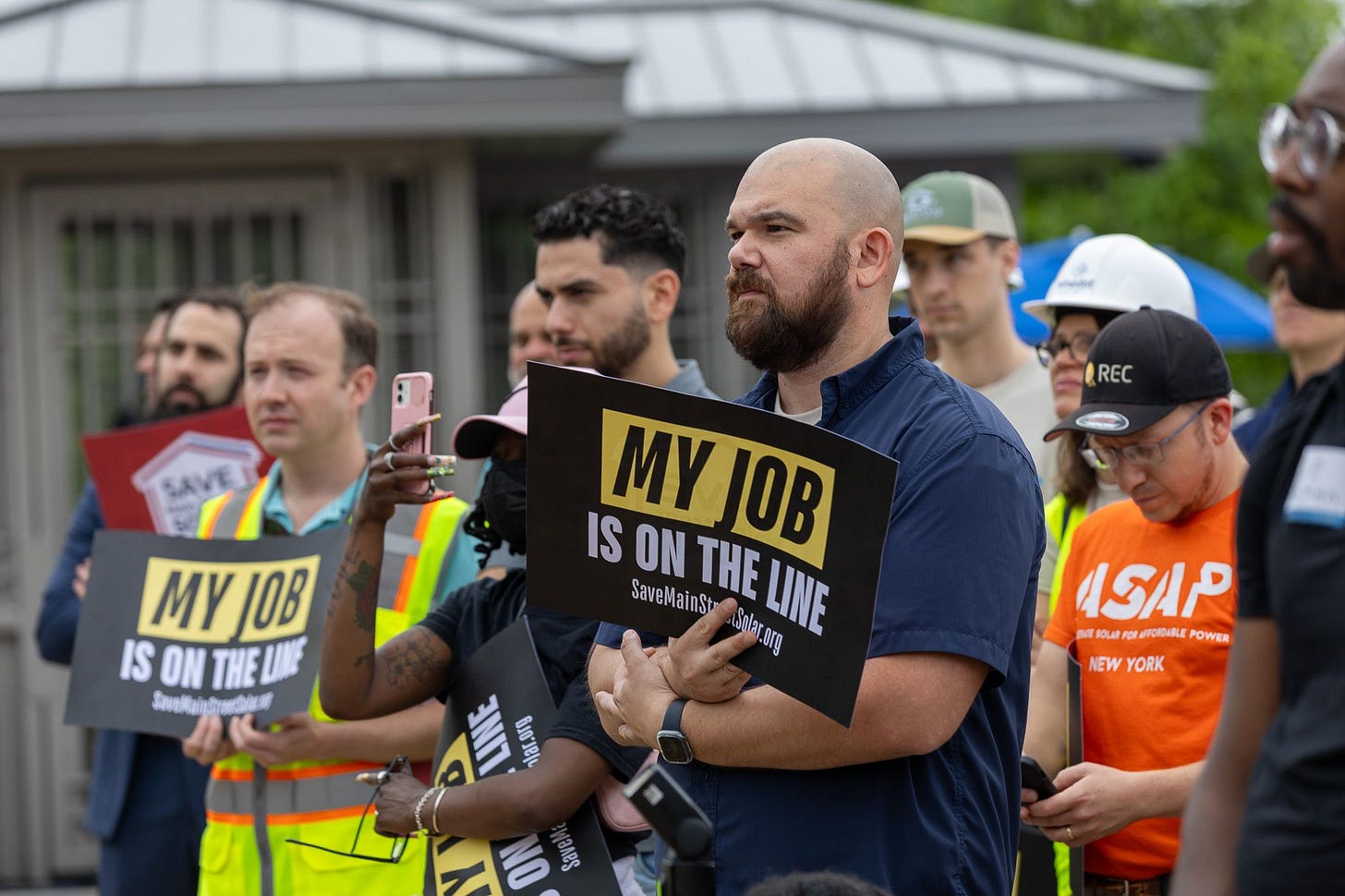Senate Republican Budget Bill Would Kill Clean Energy Jobs in Rural America
The Senate GOP budget reconciliation draft would slash wind and solar incentives to pay for tax cuts for the rich. Thousands of clean energy jobs in rural America would be lost.
President Donald Trump and his allies in Congress like to talk tough about “establishing energy dominance” and “making American energy great again,” but their draft budget reconciliation bill moving in the Senate now does just the opposite. The bill would likely cancel hundreds of energy projects—especially wind and solar projects—with enough potential energy generation to power 27.5 million homes annually.
Politico analyzed U.S. Department of Energy data and worked with policy research firm Atlas Public Policy to document wind, solar, and battery storage projects at risk from the Republican budget reconciliation proposal. Their story released today (June 20, 2025), ‘Throwing us off a cliff’: Megabill could derail hundreds of planned clean energy projects,” is a must read.
The Politico analysis included 794 clean energy projects currently in development with potential energy production of 1-megawatt or greater. The analysis does not include the thousands of geographically dispersed smaller-scale solar installations that are also coming online every day. Of the 794 clean energy projects on the list, 626 projects include wind and solar that are being targeted by Republicans. Many, many of these projects would be located in rural America.

Wind and solar projects are being targeted by Republicans, following Trump’s lead, even though wind and solar are the fastest growing sector adding capacity to the U.S. electric grid. Continued growth potential would be stalled as Republicans seek to end the Investment Tax Credit (ITC) of 30% and Production Tax Credit (PTC) of $0.0275/kWh (2023 value) that are part of the Democrats’ Inflation Reduction Act.
A 2024 Climate Power report found that the Inflation Reduction Act spurred at least 117 new clean energy projects in rural America, bringing $53 billion in investment and 52,128 jobs across 33 states.
The Solar Energy Industry Association (SEIA) is fighting back against the proposed Republican clean energy cuts. This week, SEIA announced their Save Main Street Solar campaign at a rally in Washington, DC.

“West Virginia has always been known for our coal, but over the last 12 years, something incredible has been happening. Solar has been popping up in unexpected places — on churches, on schools, on steel mills,” said Dan Conant, CEO and founder of West Virginia-based Solar Holler, who spoke at the rally.
“We’ve been doing it in neighborhoods and hollers on both sides of the tracks. We’re building them with solar panels from Georgia, with inverters from South Carolina, with racking from our neighbors across the river in Ohio. Kicking out the knees of this industry that’s delivering cheap, abundant power is not in our interest. It’s not in West Virginia’s interest. And it’s definitely not in America’s interest.”
Clean energy tax credits and incentives have historically been a bipartisan priority. Three-fourths of the clean energy projects in the Politico analysis are in Republican House districts. California might lead solar generation among states, but Republican-led Texas, Florida, and North Carolina are in the top five. The top four states for wind energy production are all led by Republicans: Texas, Iowa, Oklahoma, and Kansas.
Some Senate Republicans are speaking out against the clean energy cuts, saying they might not vote for the One Big Beautiful Bill Act due to their concerns. That seems unlikely, though, as numerous members of the House of Representatives raised similar concerns before ultimately folding to internal party pressures and voting for the House version that included similar termination of clean energy incentives.
While the Republican Senate reconciliation draft targets the rapidly growing wind and solar sectors for cuts, it predictably contains numerous incentives and regulatory priorities to continue propping up polluting fossil fuel, biofuel, nuclear, and failed “carbon capture” energy production.
The Cocklebur covers rural policy and politics from a progressive point-of-view. Our work focuses on a tangled rural political reality of dishonest debate, economic and racial disparities, corporate power over our democracy, and disinformation peddled by conservative media outlets. We aim to use facts, data, and science to inform our point-of-view. We wear our complicated love/WTF relationship with rural America on our sleeve.




Ooof